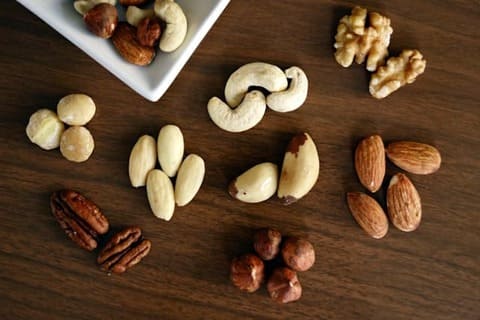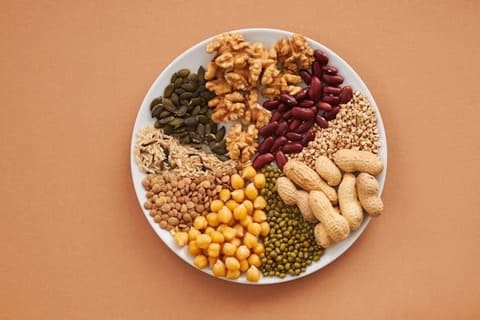Breastfeeding gives your baby the best start in life. As a new mother, your body requires extra energy and nutrients to produce milk and recover from childbirth. This guide will help you understand what to eat, what to avoid, and how to maintain a balanced diet for optimal milk production and overall health.
Why Nutrition Matters During Breastfeeding
During breastfeeding, your body requires approximately 300-500 additional calories per day compared to your pre-pregnancy needs. This is not just about eating more; it is about eating smarter. Your nutritional choices directly impact your energy levels, milk production, and overall well-being, while also influencing the quality of nutrients your baby receives through your milk.
Essential Nutrients for Breastfeeding Mothers
 |  |
Protein: Your Foundation
Aim for 65-70 grams of protein daily. Protein supports tissue repair, maintains your energy levels, and ensures adequate milk protein content. Include lean meats, fish, eggs, dairy products, legumes, nuts, and seeds in your daily meals.
Healthy Fats: Brain Food for Baby
Omega-3 fatty acids, particularly DHA, are important for your baby’s brain and eye development. Include fatty fish like salmon, sardines, and mackerel twice a week, along with walnuts, chia seeds, and flaxseeds.
Complex Carbohydrates: Sustained Energy
Choose whole grains, fruits, and vegetables to maintain steady blood sugar levels and sustained energy throughout your demanding days and nights.
Calcium and Vitamin D: Bone Health
Your body will draw calcium from your bones to ensure adequate levels in your milk. Consume 1,000mg of calcium daily through dairy products, leafy greens, fortified plant milks, and canned fish with bones.
 |  |
Foods That Naturally Support Milk Production
While every mother’s body responds differently, certain foods have traditionally been associated with supporting healthy milk supply:
a) Oats: Rich in iron and beta-glucan, oats may help increase prolactin levels. Start your day with a hearty bowl of oatmeal topped with nuts and berries.
b) Leafy Greens: Spinach, kale, and other dark leafy greens provide folate, iron, and calcium. They also contain phytoestrogens that may support lactation.
c) Almonds: These nutrient-dense nuts provide protein, healthy fats, and vitamin E. A handful makes an excellent snack.
d) Salmon: Beyond its omega-3 content, salmon provides high-quality protein and may help support milk production.
e) Sesame Seeds: Often used in lactation cookies, these tiny seeds are rich in calcium and healthy fats.
f) Fennel: This aromatic herb has been used traditionally to support lactation and may help with digestive comfort.
g) Chickpeas and Lentils: These protein-rich legumes also provide fiber and may support milk supply.
Practical Diet Tips for Busy Mothers
Meal Planning Made Simple
- Prepare freezer-friendly meals during pregnancy or early postpartum
- Batch cook proteins and grains on weekends
- Keep healthy snacks readily available: nuts, fruits, yogurt, and whole grain crackers
Energy-Boosting Combinations
- Pair complex carbs with protein: apple slices with almond butter, whole grain toast with avocado
- Include healthy fats in every meal to support hormone production and satiety
- Do not skip meals – aim for three balanced meals plus 2-3 nutritious snacks
Quick and Nutritious Meal Ideas
- Smoothies packed with fruits, vegetables, protein powder, and healthy fats
- One-pot meals with lean protein, vegetables, and whole grains
- Overnight oats prepared the evening before
- Sheet pan dinners that cook while you tend to baby
The Importance of Hydration
Water is one of the most important “nutrients” for breastfeeding mothers. Breast milk is approximately 88% water, and dehydration can quickly impact both your milk supply and your energy levels.
How Much Water Do You Need?
Aim for at least 8-10 glasses of water daily, plus an additional glass each time you nurse. Many mothers find it helpful to keep a large water bottle nearby during feeding sessions.
Hydration Tips:
- Start each day with a large glass of water
- Keep water bottles in multiple locations around your home
- Set reminders on your phone if you frequently forget to drink
- Include hydrating foods like watermelon, cucumbers, and soups
- Limit caffeinated beverages, as they can contribute to dehydration
Foods and Substances to Limit or Avoid
While breastfeeding does not require a restrictive diet, certain substances should be limited or avoided:
a) Alcohol: If you choose to drink occasionally, time it carefully. Alcohol peaks in breast milk 30-60 minutes after consumption. Wait at least 2-3 hours per drink before nursing.
b) High-Mercury Fish: Limit shark, swordfish, king mackerel, and tilefish. Choose low-mercury options like salmon, sardines, and light tuna instead.
c) Excessive Caffeine: Limit to 1-2 cups of coffee per day. Newborns are particularly sensitive to caffeine, which can cause fussiness and sleep disruption.
d) Highly Processed Foods: While convenient, these foods are often high in sodium, sugar, and unhealthy fats while being low in essential nutrients.
e) Potential Allergens: You do not need to avoid common allergens unless your baby shows signs of sensitivity. If you suspect a food allergy, consult your pediatrician before eliminating foods.
Common Myths About Breastfeeding Diets Debunked
Myth: You need to drink milk to make milk
Truth: While dairy can be a good source of calcium and protein, it is not necessary for milk production. Many cultures with low dairy consumption have successful breastfeeding rates.
Myth: Certain foods will make your baby gassy
Truth: Very few foods in your diet directly cause gas in your baby. Babies’ digestive systems are still developing, which naturally causes some gas and fussiness.
Myth: You must eat bland foods to avoid upsetting your baby
Truth: Babies are exposed to flavors through amniotic fluid during pregnancy. Eating a varied, flavorful diet may actually help your baby accept diverse foods later.
Myth: Pumping mothers need to eat differently
Truth: Whether you are nursing directly or pumping, your nutritional needs remain the same.
Myth: You cannot lose weight while breastfeeding
Truth: Gradual weight loss (1-2 pounds per week) is safe and normal while breastfeeding, especially when combined with proper nutrition and moderate exercise.
Myth: Low milk supply is always due to poor diet
Truth: While nutrition plays a role, low milk supply can have many causes including insufficient milk removal, hormonal issues, or medical conditions.
Also read our blog on Common Myths About Breastfeeding
Creating Your Personal Nutrition Plan
Every mother’s needs are unique. Consider these factors when developing your nutrition strategy:
- Your pre-pregnancy weight and overall health
- Whether you are exclusively breastfeeding or combination feeding
- Your activity level and sleep patterns
- Any dietary restrictions or preferences
- Your baby’s age and feeding patterns
When to Seek Professional Help
Consult with a healthcare provider or registered dietitian if you experience:
- Significant fatigue that does not improve with rest
- Concerns about milk supply
- Postpartum depression or anxiety affecting your appetite
- Difficulty maintaining a healthy weight
- Questions about supplements or special dietary needs

Final Thoughts: Nourishing Yourself is Nourishing Your Baby
Remember that taking care of your nutritional needs is not selfish; it is essential. A well-nourished mother is better equipped to care for her baby, maintain her energy levels, and enjoy the breastfeeding experience. Be patient with yourself as you navigate this new phase of life, and do not hesitate to ask for help when you need it.
Your breastfeeding experience is unique, and your nutritional needs may evolve as your baby grows and your circumstances change. Focus on progress, not perfection, and celebrate the incredible work your body is doing every single day.
By prioritizing your nutrition, staying hydrated, and listening to your body’s needs, you are setting the foundation for a successful and enjoyable breastfeeding experience that benefits both you and your precious little one.